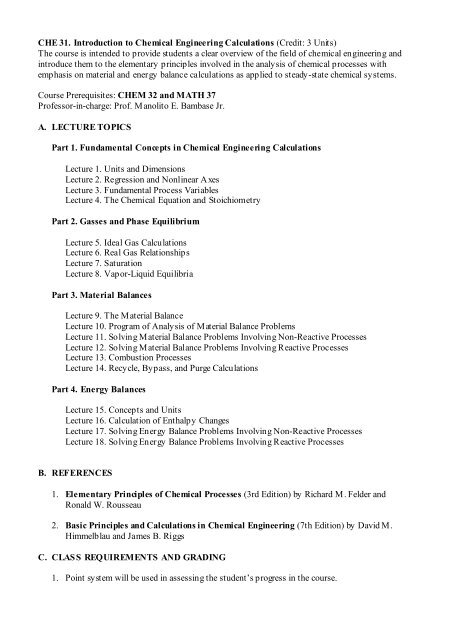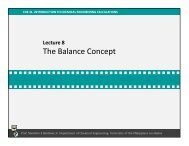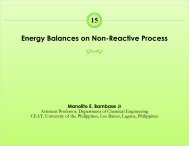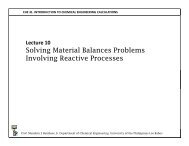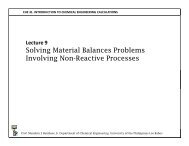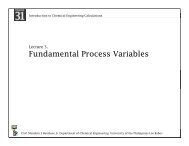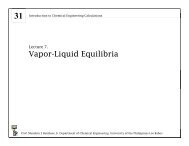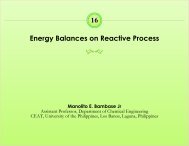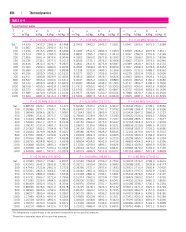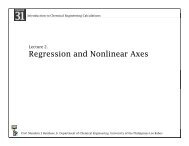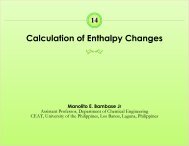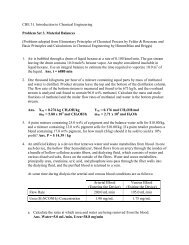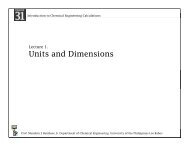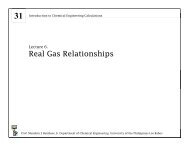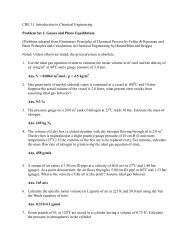CHE 31. Introduction to Chemical Engineering Calculations (Credit ...
CHE 31. Introduction to Chemical Engineering Calculations (Credit ...
CHE 31. Introduction to Chemical Engineering Calculations (Credit ...
You also want an ePaper? Increase the reach of your titles
YUMPU automatically turns print PDFs into web optimized ePapers that Google loves.
<strong>CHE</strong> <strong>31.</strong> <strong>Introduction</strong> <strong>to</strong> <strong>Chemical</strong> <strong>Engineering</strong> <strong>Calculations</strong> (<strong>Credit</strong>: 3 Units)<br />
The course is intended <strong>to</strong> provide students a clear overview of the field of chemical engineering and<br />
introduce them <strong>to</strong> the elementary principles involved in the analysis of chemical processes with<br />
emphasis on material and energy balance calculations as applied <strong>to</strong> steady-state chemical systems.<br />
Course Prerequisites: <strong>CHE</strong>M 32 and MATH 37<br />
Professor-in-charge: Prof. Manoli<strong>to</strong> E. Bambase Jr.<br />
A. LECTURE TOPICS<br />
Part 1. Fundamental Concepts in <strong>Chemical</strong> <strong>Engineering</strong> <strong>Calculations</strong><br />
Lecture 1. Units and Dimensions<br />
Lecture 2. Regression and Nonlinear Axes<br />
Lecture 3. Fundamental Process Variables<br />
Lecture 4. The <strong>Chemical</strong> Equation and S<strong>to</strong>ichiometry<br />
Part 2. Gasses and Phase Equilibrium<br />
Lecture 5. Ideal Gas <strong>Calculations</strong><br />
Lecture 6. Real Gas Relationships<br />
Lecture 7. Saturation<br />
Lecture 8. Vapor-Liquid Equilibria<br />
Part 3. Material Balances<br />
Lecture 9. The Material Balance<br />
Lecture 10. Program of Analysis of Material Balance Problems<br />
Lecture 11. Solving Material Balance Problems Involving Non-Reactive Processes<br />
Lecture 12. Solving Material Balance Problems Involving Reactive Processes<br />
Lecture 13. Combustion Processes<br />
Lecture 14. Recycle, Bypass, and Purge <strong>Calculations</strong><br />
Part 4. Energy Balances<br />
Lecture 15. Concepts and Units<br />
Lecture 16. Calculation of Enthalpy Changes<br />
Lecture 17. Solving Energy Balance Problems Involving Non-Reactive Processes<br />
Lecture 18. Solving Energy Balance Problems Involving Reactive Processes<br />
B. REFERENCES<br />
1. Elementary Principles of <strong>Chemical</strong> Processes (3rd Edition) by Richard M. Felder and<br />
Ronald W. Rousseau<br />
2. Basic Principles and <strong>Calculations</strong> in <strong>Chemical</strong> <strong>Engineering</strong> (7th Edition) by David M.<br />
Himmelblau and James B. Riggs<br />
C. CLASS REQUIREMENTS AND GRADING<br />
1. Point system will be used in assessing the student’s progress in the course.
2. The requirements for grading shall be composed of:<br />
1 Mid-Term Exam (Parts 1 & 2) 200 pts<br />
1 Pre-Final Exam (Parts 3 & 4) 200 pts<br />
10 Assessment Tests (20 pts each) 200 pts<br />
4 Class Recitation (25 pts each) 100 pts<br />
--------------------------------------------------------------------<br />
PREFINAL STANDING 700 pts<br />
Final Examination 300 pts<br />
--------------------------------------------------------------------<br />
FINAL STANDING 1000 pts<br />
3. A student with a prefinal standing of 490 (or < 250) will be included in the exemption list<br />
and may opt not <strong>to</strong> take the final examination.<br />
4. The final grade of the student in the course is determined as follows:<br />
D. CLASS POLICIES<br />
Exempted from taking<br />
the final examination<br />
Not exempted from<br />
taking the final<br />
examination<br />
FINAL<br />
GRADE<br />
670 – 700 956 – 1000 1.00<br />
640 – 669 911 – 955 1.25<br />
610 – 639 866 – 910 1.50<br />
580 – 609 821 – 865 1.75<br />
550 – 579 776 – 820 2.00<br />
520 – 549 731 – 775 2.25<br />
490 – 519 686 – 730 2.50<br />
641 – 685 2.75<br />
600 – 640 3.00<br />
550 – 599 4.00<br />
< 250 < 550 5.00<br />
1. A student who misses a long exam must present an official excuse slip from the college<br />
secretary on his return <strong>to</strong> class in order <strong>to</strong> have a make-up exam. Grace period for the make-up<br />
exam is one week after the student’s return <strong>to</strong> class.<br />
2. Questions regarding the checking of exam papers will be entertained only within one week<br />
after the return of corrected exam papers.<br />
3. A student caught cheating will be penalized with a grade of 5.0 for the course.<br />
4. University policy on attendance will be followed.<br />
E. IMPORTANT DATES<br />
Jun 16 (W) - Last day for late registration<br />
Aug 6 (F) - Last day for dropping of subjects without evaluation
Aug 9 (M) - <strong>CHE</strong> 31 Mid-Term Exam (6 – 9 PM)<br />
Sep 3 (F) - Last day for dropping of subjects with “PASS” or “FAIL” evaluation<br />
Sep 13 (M) - Last day of holding activities<br />
Oct 7 (Th) - Last day of classes<br />
- <strong>CHE</strong> 31 Pre-final Exam (6 – 9 PM)


